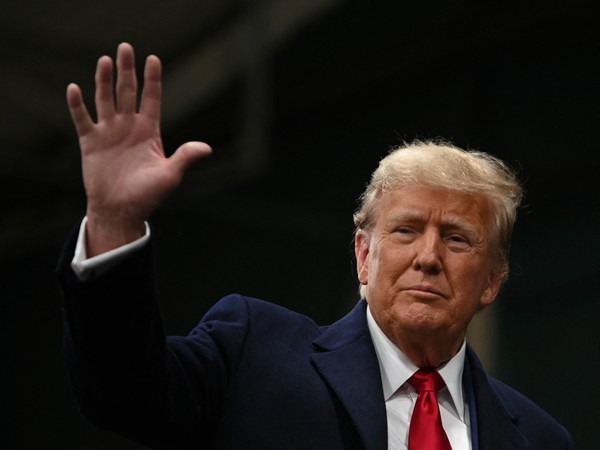Trump camp says China 'Attacking' U.S. with Fentanyl, plans response
Nov 27, 2024
Washington [US], November 27: Donald Trump's return to power portends a shakeup in the U.S. approach to addressing America's fentanyl crisis and what counternarcotics officials say is the biggest obstacle to solving it: China.
Advisors to the Republican president-elect's transition team are advocating a much more aggressive posture towards Beijing over fentanyl than the one adopted by Democratic incumbent Joe Biden.
Already, Trump is signaling that to stem the flow of narcotics he will resort to his weapon of choice: tariffs.
In posts on Monday on Truth Social, his social network, he promised additional 10% tariffs on goods from China, and 25% duties on merchandise from Mexico and Canada. Trump claimed these nations have not taken strong enough action to stop illicit drugs, particularly fentanyl, from entering the United States. He said his many talks with China about stopping the flow of drugs were "to no avail."
Trump's advisors are likewise pushing for U.S. sanctions on Chinese financial institutions allegedly linked to the fentanyl trade. Trump will be the ultimate decider.
China is the dominant source of chemical precursors used by Mexican cartels to produce fentanyl, while Chinese money launderers have become key players in the international drug trade, U.S. authorities say. The Biden administration has been negotiating with Beijing for the past year to crack down on both. Diplomacy has yielded promising but modest results so far. That has frustrated some U.S. security officials and China hawks who say the U.S. must ratchet up the pressure to get Beijing's leadership to act.
"When you don't do those things, then you're a doormat," said Steve Yates, a China expert and former national security official in the George W. Bush administration. Yates, who is not formally involved with the president-elect's transition team, has advised Trump's circle on fentanyl policy. Over the past decade, more than 400,000 Americans have died of synthetic opioid overdoses, including Yates' daughter, who died last year.
Yates and others counseling the Trump team say one of the quickest and surest ways for Washington to get Beijing's attention is to sanction Chinese banks doing business with money launderers and corrupt chemical sellers.
Foreign banks hit with U.S. sanctions can't engage with American financial institutions or access the U.S. dollar, severely curtailing their ability to transact business internationally, according to Edward Fishman, a sanctions expert at Columbia University. He said Washington can also freeze U.S. assets held in sanctioned banks.
It's a powerful weapon that has been wielded against financial institutions in countries of some U.S. adversaries such as Iran and Russia, but never against banks in Mexico and China tied to drug trafficking, according to David Asher, a top former U.S. anti-money laundering official who helped target the finances of the Islamic State terrorist group.
"You need to hit all the bankers. It's sort of basic," said Asher, now a senior fellow at the Hudson Institute, a conservative think tank in Washington.
Asher formulated a preliminary plan circulating in Trump transition circles that calls for a whole-of-government task force incorporating all aspects of U.S. diplomatic, law enforcement and financial power to address the fentanyl crisis.
Parts of the plan, shared with Reuters, call for criminal indictments of major Chinese and Mexican financial institutions allegedly laundering money for the cartels; mass sanctions on Chinese companies and people implicated in the fentanyl trade; beefed-up bounties on most-wanted traffickers; cyber warfare against Mexican cartels; and a U.S. intelligence agency focus on fentanyl that's commensurate with the war on terrorist organizations.
A spokesperson for the Chinese Embassy in Washington cited numerous steps that China has taken to prevent illegal production, trafficking and abuse of fentanyl since talks with the Biden administration resumed. The embassy warned that China would respond if the U.S. takes a more combative posture.
"Sanctions, smears and slander against China will only undermine the foundation of China-U.S. counternarcotics cooperation," the embassy said in a statement. "China firmly opposes the U.S.'s arbitrary use of unilateral sanctions and will resolutely safeguard its legitimate rights and interests."
Hostility toward China's government has taken root on Capitol Hill, with both Democrats and Republicans urging trade actions to punish Beijing for what some believe is a deliberate effort to destabilize the United States with fentanyl.
Trump's promised 10% tariffs on China over narcotics might just be an opening volley. Howard Lutnick, Trump's pick to run the Commerce Department and oversee the Office of the U.S. Trade Representative, said in a podcast interview in October that "China is attacking America" with fentanyl and suggested that Trump might levy tariffs as high as 200% on China.
On the campaign trail, Trump vowed to designate Mexico's drug cartels as terrorist groups and harness the U.S. military to destroy them.
But it's not clear if Trump is willing to move beyond tariffs on Chinese goods and take stronger actions such as hitting Chinese banks with sanctions over fentanyl.
Trump's past disputes with Beijing have centered mostly on China's huge trade surplus, not synthetic opioids. Trump expressed admiration, even love, for Chinese President Xi Jinping throughout much of his first term, even as U.S. overdose fatalities soared.
Trump transition team spokeswoman Karoline Leavitt, asked by Reuters if his administration's increased pressure on China over fentanyl might include bank sanctions, said Americans re-elected Trump "to lead our country and restore peace through strength around the world." She said Trump would "take the necessary action to do just that" when he returns to the White House.
A Reuters investigation into the global fentanyl supply chain has shown how easy it is to purchase precursors online from Chinese sellers, who ship them by air to the U.S. disguised as gadgets and other low-cost merchandise. These boxes typically sail through customs duty-free amid a sea of other Chinese imports, and are routed by traffickers to Mexican drug labs. Bipartisan sentiment is growing in Washington to end China's use of this streamlined entry channel.
There is growing consensus in Republican circles close to Trump that Beijing has exploited, even engineered, the synthetic opioid epidemic to harm Americans. They point to a bipartisan report issued in April by the House of Representatives' select committee on China that calls that nation the "ultimate geographic source" of the fentanyl crisis. The report alleges that Beijing provides tax rebates to Chinese companies that export fentanyl chemicals, and that it allows groups linked to drug trafficking to operate as long as their efforts are focused abroad.
Source: Fijian Broadcasting Cooperation








